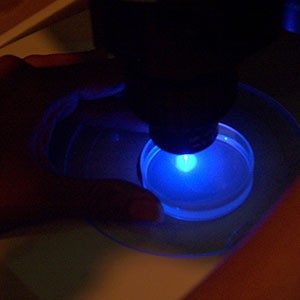A $500,000 gift from the Mary K. Chapman Foundation of Tulsa will advance research at the Peggy and Charles Stephenson Cancer Center with the goal of finding new ways to diagnose and treat ovarian cancer, one of the deadliest cancers for women.
The gift supports collaborative research between the Stephenson Cancer Center at the University of Oklahoma and MD Anderson Cancer Center, bringing together expertise in gynecologic cancers at both institutions.
“The University is deeply grateful for this gift which makes a great contribution to the health and well being of women in our state,” said OU President David L. Boren.
According to the American Cancer Society, ovarian cancer claims the lives of more than 15,000 women annually in the United States. Its overall five year survival rate is just 43 percent.
"Ovarian cancer often is not diagnosed until it is in an advanced stage. That’s because the early warning signs are often subtle and can be missed. That’s why this gift is so important. It helps further research at two top cancer centers, where we hope to find new ways to treat this deadly cancer and to identify ovarian cancer early when it is most treatable,” said Robert Mannel, M.D., director of the Stephenson Cancer Center.
The gift funds two collaborative research projects. The first targets the tumor microenvironment, the process in which tumor cells interact with surrounding cells. The tumor microenvironment plays an important role in the progression of ovarian cancer. By better defining this process, researchers hope to identify novel therapeutic targets.
Participating Stephenson Cancer Center researchers include Xin Zhang, M.D., Ph.D.; Danny Dhanasekaran, Ph.D.; and Doris Benbrook, Ph.D.
Participating MD Anderson researchers include Sam Mok, Ph.D.; Kwong Wok, Ph.D.; Bulent Ozpolat, M.D., Ph.D.; and Liu Jinsong, M.D., Ph.D.
The second project funded by the gift focuses on innovative detection methods and molecular profiling of ovarian cancer. It aims to improve ovarian cancer detection through a unique diagnostic test that detects circulating tumor cells. In addition, the project profiles ovarian cancer at the micro-RNA level in an effort to better predict which patients will respond to treatment.
Participating Stephenson Cancer Center researchers include Rajagopal Ramesh, Ph.D.; Scott McMeekin, M.D.; Katherine Moxley, M.D.; and Kathleen Moore, M.D.
Participating MD Anderson researchers include Anil Sood, M.D.; Alpa Nick, M.D.; and Robert Coleman, M.D.
The Stephenson Cancer Center leads the nation in advancing the treatment of women with ovarian cancer through clinical trials research. Its investigators have been instrumental in evaluating new therapies and raising the standard of care for women with this deadly disease.
Ovarian cancer also is one of MD Anderson’s six “Moon Shot” programs – programs focused on fighting specific cancers by combining the latest treatment technology and genetic knowledge.
“We are very grateful to the trustees of the Chapman Foundation for this significant gift. It will help accelerate multidisciplinary, team-oriented cancer research at both institutions,” Mannel said.
Leadership of the Stephenson Cancer Center and MD Anderson Cancer Center began discussions in 2009 about how to promote research collaborations between the two institutions. A Memorandum defining a joint Steering Committee to oversee collaborative research was signed in 2009 and renewed in 2012. The Chapman Foundation gift is the first of an anticipated $2 million to be raised from private donors in support of collaborative projects with MD Anderson Cancer Center focused on a number of different types of cancer.
For more information about the Stephenson Cancer Center, visit www.StephensonCancerCenter.org. Additional information about the MD Anderson Cancer Center can be found at www.mdanderson.org.



